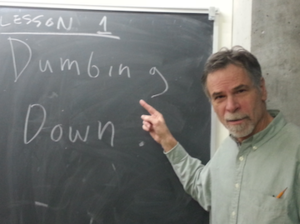Difference between revisions of "Dumbing Down"
m (→Links) |
|||
| Line 21: | Line 21: | ||
[[Media Monopolies]] help by promoting spectacle over information or meaningful discussion. | [[Media Monopolies]] help by promoting spectacle over information or meaningful discussion. | ||
| + | |||
History can be complicated and full of morally grey areas that promote critical thinking and subjective opinions. The [[Distorting History]] pattern can be used to simplify history to more quantifiable and less subjective facts. This also has the effect of dumbing down. | History can be complicated and full of morally grey areas that promote critical thinking and subjective opinions. The [[Distorting History]] pattern can be used to simplify history to more quantifiable and less subjective facts. This also has the effect of dumbing down. | ||
| + | |||
[[Denialism]] is a mechanism through which dumbing down can be promoted and assimilated—and not challenged. | [[Denialism]] is a mechanism through which dumbing down can be promoted and assimilated—and not challenged. | ||
| + | |||
[[Assembly Line Education]] is a type of education that is extremely dumbed down by promoting mediocrity and conformity over exceptionality. | [[Assembly Line Education]] is a type of education that is extremely dumbed down by promoting mediocrity and conformity over exceptionality. | ||
Latest revision as of 09:44, 11 March 2014
Description
The term Dumbing Down started in 1933 when motion picture screenplay writers changed the way they wrote in order to gain appeal with those of who had little education or intelligence. However, Dumbing Down will usually involve simplifying critical thought to a point where it begins to undermine intellectual standards of learning in a society. This then trivializes cultural, artistic, and academic standards.
How it Works
Dumbing Down has been frequently used in the workplace in the last century, often by the name, “de-skilling.”[1] De-skilling involves reducing responsibility and skills needed for the employee to perform their work tasks. This is considered by some to increase efficiency, profits, and management control. The assembly line model of manufacturing, where every employee only does one repetitive task, over and over, is an example of this kind of pattern used in the workplace. Critics state that this kind of model reduces the employee’s autonomy, flexibility, and often results in lower workplace moral.[2] This pattern can also be used in the social sphere where critical thinking can be discouraged. Some scholars suggest that media encourages dumbing down by focusing on the spectacle rather than meaningful discussion, and that some principles of economics promote measuring success via monetary gain over all else having a dumbing down effect as well. [3]
Evidence
In the late 20th century, the increased number of students attending university, because of lowered scholastic aptitude standards, required the establishment and maintenance of intellectual distinctions; thus, in 2003, the UK Minister for Universities, Margaret Hodge, criticized Mickey Mouse degrees as a negative consequence of universities dumbing down curricula to meet “the needs of the market”, degrees conferred for studies in a field of endeavor "where the content is perhaps not as [intellectually] rigorous as one would expect, and where the degree, itself, may not have huge relevance in the labour market", thus, a university degree of slight intellectual substance, which the student earned by "simply stacking up numbers on Mickey Mouse courses, is not acceptable"[4][5]
Strict standardized testing methods prize quantitative skills rather than qualitative skills by promoting memorized learning rather than critical thinking. This helps to create a system that strives for mediocrity over the extraordinary.[6]
The science fiction film Idiocracy (2005) portrays the U.S. as a greatly dumbed-down society five hundred years hence; which low cultural condition was achieved with dysgenics, over-reproduction by people of low intelligence being greater than the rate of reproduction of people of high intelligence, i.e. the educated.
The novel Brave New World (1931), by Aldous Huxley, discussed the ways that society was effectively dumbed-down in order to maintain political stability and social order.
Links
Media Monopolies help by promoting spectacle over information or meaningful discussion.
History can be complicated and full of morally grey areas that promote critical thinking and subjective opinions. The Distorting History pattern can be used to simplify history to more quantifiable and less subjective facts. This also has the effect of dumbing down.
Denialism is a mechanism through which dumbing down can be promoted and assimilated—and not challenged.
Assembly Line Education is a type of education that is extremely dumbed down by promoting mediocrity and conformity over exceptionality.
Resources and References
- ↑ Braverman, H. (1998) Labor and Monopoly Capitalism, New York: Monthly Review Press.
- ↑ Schuler, Doug. "Cultivating society's civic intelligence: patterns for a new 'world brain'." Information, Communication & Society 4.2 (2001): 157-181.
- ↑ Schuler, Doug. "Cultivating society's civic intelligence: patterns for a new 'world brain'." Information, Communication & Society 4.2 (2001): 157-181.
- ↑ "'Irresponsible' Hodge under fire", BBC News, 14 January 2003. URL accessed on 24 June 2006.
- ↑ "50% higher education target doomed, says thinktank",EducationGuardian.co.uk, 14 July 2005. URL accessed on 24 June 2006.
- ↑ Kohn, Alfie. The case against standardized testing: Raising the scores, ruining the schools. Portsmouth, NH: Heinemann, 2000.

